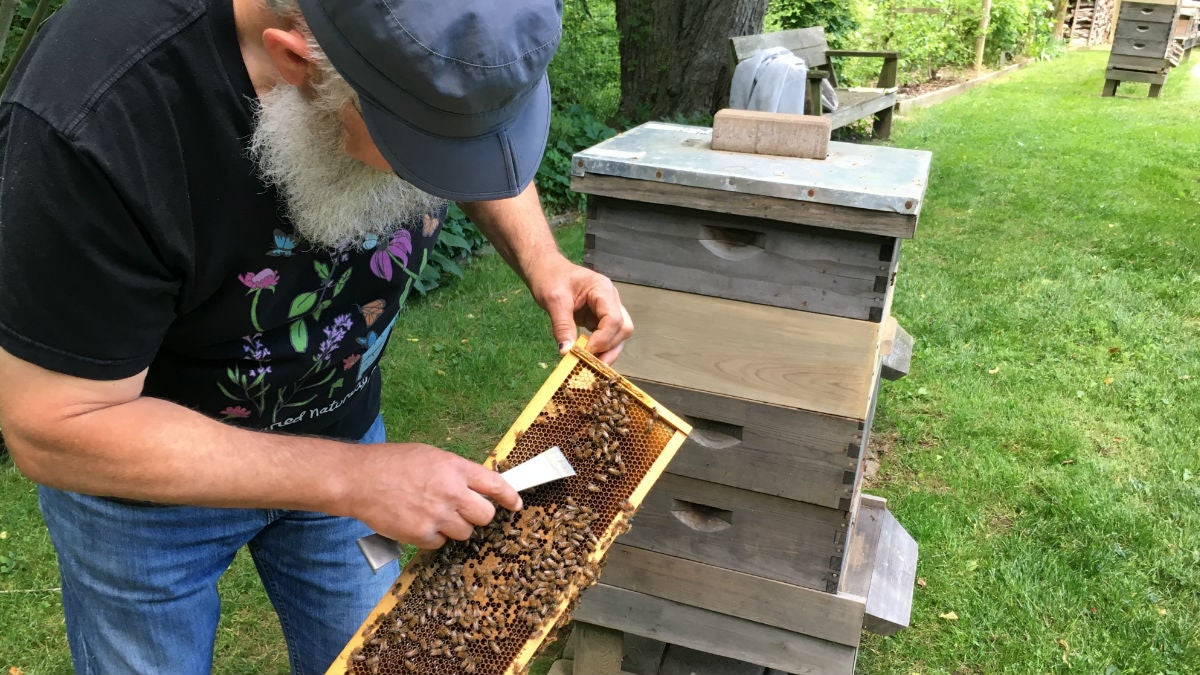Delaware beekeepers focus on bee health [photos + video]
Listen
Newark beekeeper Ray Walker inspects bees in his backyard apiary near White Clay Creek State Park. (Mark Eichmann/WHYY)
Earlier this year, the rusty patched bumblebee was added to the endangered species list. The plight of bees has received a lot of attention, and it’s on the mind of local beekeepers.
In a quiet corner of Newark near White Clay Creek State Park, Ray Walker tends to his bees. He monitors several hives in his backyard, checking hive temperature, watching for queen bees to produce more bees, and keeping an eye out for disease or parasites.
Walker uses natural, traditional beekeeping methods to manage his collection of hives, known as an apiary. He uses native Delaware plants to produce smoke to calm the bees down. “These are old-timey beekeeping practices that have kind of been lost overtime,” Walker said.
With a few puffs of smoke, the bee’s chemical communication signals are interrupted, making them more docile. It’s a process that Walker, a former DuPont chemical engineer, can relate to. “That’s one of the things that fascinates me is these naturally occurring compounds that biologically signal different messages to the bee colony: ‘We need more pollen.’ ‘We need more nectar.’ I think there’s roughly 30 different messages that they use, so they have a very social structure.”
Walker is one of more than 200 registered beekeepers in Delaware. Making sure all those hives are registered is part of Meghan McConnell’s job. She recently took on the role of state apiarist, a fancy word for the state’s top bee keeper. “The main goal of the state apiarist is to work with the beekeepers throughout the state and make sure that we aren’t getting any kind of new diseases that could come into our state,” McConnell said.
She recently set up a pair of hives at the Dept. of Agriculture’s headquarters in Dover. “The colony on the left is a nucleus colony that we bought about a month ago… and the colony on the right is a swarm that we caught on the Delaware Memorial Bridge.”
In addition to educating the public with the demonstration hives and assisting Delaware beekeepers, McConnell also monitors bees brought into Delaware to help farmers with pollinating their crops. “We get a lot of bees from out of state, from Florida, Maryland, New Jersey and West Virginia to pollinate our watermelons and cucurbits, pumpkins, pickles, things like that,” she said. “We probably have about 3,000 colonies that come in or out of our state.”
She’s also on the lookout for threats to the bee population, and there’s no shortage of hazards, especially because so much bee habitat in Delaware has been paved over and urbanized. In addition to some overuse of pesticides by residents, and pesticides getting blown from farm fields, the bee population is threatened by various diseases and parasites. “We have a varroa mite, it’s kind of like a little tick. It’s the same size on a bee as would be for a dinner plate on us, and it’s sucking its blood and transferring different types of viruses.”
Last winter, about 43 percent of Delaware’s bee colonies died, a higher than normal number according to the national Bee Informed Partnership. “We lose a lot of colonies in the winter from viruses, bacteria infection and fungal infection,” Walker said. “That’s part of beekeeping, is recognizing diseases.”
To help improve the chances of survival for Delaware’s bees, McConnell suggests planting bee-friendly plants or vegetables around your home. “There’s definitely different plants you could plant for your garden that will help. Any vegetable, cucumber, squash, pumpkins, [bees are] going to come visit.”
Some Delaware chicken farmers are taking steps to help out too. “That is a goal in Delaware that we are trying to get them to plant more pollinator friendly buffers throughout their chicken areas,” McConnell said.
With the help of the Delmarva Poultry Industry group, chicken farmers are planting bee-friendly buffer crops around the chicken houses that will not only attract bees, but also help improve water quality by trapping nutrients with their roots.Every little step helps, and for keepers like Ray Walker, helping maintain a healthy bee population is a fulfilling hobby.
“It’s a lot of physical work, so that discourages a lot of people who work full time. There aren’t many hours in the day, but fortunately for us retired guys, it’s a perfect fit.”
WHYY is your source for fact-based, in-depth journalism and information. As a nonprofit organization, we rely on financial support from readers like you. Please give today.





